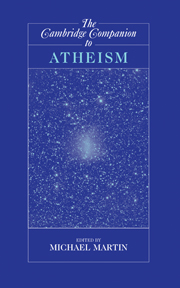Book contents
- Frontmatter
- General Introduction
- Part I Background
- Part II The Case against Theism
- 4 Theistic Critiques of Atheism
- 5 The Failure of Classical Theistic Arguments
- 6 Some Contemporary Theistic Arguments
- 7 Naturalism and Physicalism
- 8 Atheism and Evolution
- 9 The Autonomy of Ethics
- 10 The Argument from Evil
- 11 Kalam Cosmological Arguments for Atheism
- 12 Impossibility Arguments
- Part III Implications
- Index
- Series List
5 - The Failure of Classical Theistic Arguments
from Part II - The Case against Theism
Published online by Cambridge University Press: 28 January 2007
- Frontmatter
- General Introduction
- Part I Background
- Part II The Case against Theism
- 4 Theistic Critiques of Atheism
- 5 The Failure of Classical Theistic Arguments
- 6 Some Contemporary Theistic Arguments
- 7 Naturalism and Physicalism
- 8 Atheism and Evolution
- 9 The Autonomy of Ethics
- 10 The Argument from Evil
- 11 Kalam Cosmological Arguments for Atheism
- 12 Impossibility Arguments
- Part III Implications
- Index
- Series List
Summary
The ontological, cosmological, and teleological arguments are generally taken to be the major classical theistic arguments; however, a case can be made for also including the argument from religious experience, since within each of the great extant theistic religions there is a mystical tradition for making claims about God's existence and nature on the basis of apparent direct nonsensory perceptions of God. Each of these four arguments is discussed in turn.
THE ONTOLOGICAL ARGUMENT
There are many different versions of this argument. What they have in common is an attempt to deduce God’s existence from a mere analysis of the concept of God. Furthermore, they are a priori arguments, because all of their premises are supposed to be knowable independently of sense experience. They are the darlings of theists who are enamored of the mathematical style of reasoning. In response to critics, such as Hume and the logical positivists, who deny that existence can ever be deduced from an analysis of concepts, they could say that this is just what happens in mathematics when, for example, the existence of a number meeting certain conditions is deduced from axioms, definitions, and postulates, all of which are knowable a priori. And given that God resembles numbers in respect to not being in space or time, the possibility of deducing God’s existence a priori must not be dismissed out of hand.
- Type
- Chapter
- Information
- The Cambridge Companion to Atheism , pp. 86 - 101Publisher: Cambridge University PressPrint publication year: 2006
- 1
- Cited by



